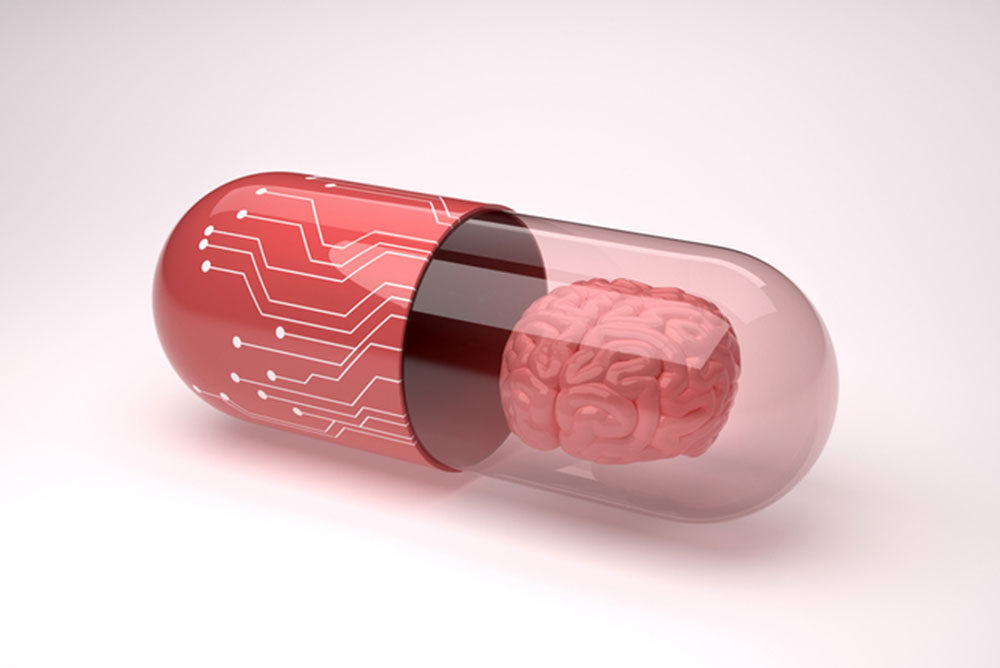
iStock
SUPPLEMENTS TO improve memory or stave off dementia are ineffective based on current research, with the possible exception of omega-3 fatty acids, Jane Brody wrote in last week’s Science Times.
But the specific supplements currently giving highest hopes to many —L-serine and NAD+— although they may be equally unsupported by evidence, do not appear on Brody’s list of ineffectuals. That list includes gingko biloba, coenzyme Q10, huperzine A, caprylic acid and coconut oil, and coral calcium.
What continues to spur both research and personal use of supplements to combat age-related dementia and Alzheimer’s Disease (AD) is the repeated failure of drugs designed to combat formation in the brain of the beta amyloid protein plaque associated with AD.
Since 2003, despite more than 300 clinical trials, the FDA has approved no new drugs for AD, and the five approved before that offer only limited, temporary relief.
The experiment, halted last week, on the most recent hopeful, aducanumab, cast more doubt on the importance of these plaques in causing dementia associated with AD. The drug, tested on patients showing very early signs of disease, was the most recent bet for removing plaques.
Besides these drugs, some of the best results to date—reversing symptoms of AD about half of patients—come from the 36-recommendation protocol that includes a list of supplements, elucidated in Dale Bredesen’s 2017 book, The End of Alzheimer’s. Bredesen’s protocol is based not on the amyloid hypothesis, but on the idea that an array of age-related changes are to blame for deterioration of cognitive functioning.
As a result, his program focuses on controlling blood sugar, reducing inflammation and correcting other imbalances that occur with aging. Among the program’s diet restrictions are those dubbed KetoFlex 12/3: keto to help control blood sugar levels; flex, because the allowed food groups can flex from paleo to vegan; and 12/3, restricting eating to a 12-hour window and leaving at least three hours between the last meal and bedtime, according to Minnesota Integrative Health practitioner Karen Vrotchka.
Among supplements arousing enthusiasm, L-serine is an amino acid produced by the body and consumed in soy, eggs, meat and other foods. Although Fortune magazine in February deemed L-serine worthy of 20 pages, research has not yet linked its levels to cognitive function, and postmortem studies have found no differences in levels in the brains of AD patients compared with those of healthy people.
Excitement comes from the discovery of an odd hybrid of ALS and AD symptoms in people living on Guam, which is blamed on their consumption of the chemical BMAA from eating bats. High levels of BMAA, traced to cycad plants in the bats’ diet, appeared to replace L-serine in sufferers’ brain cell membranes, creating a deficiency of the amino acid that was linked to cognitive deterioration: there is a possibility that BMAA from other sources could be doing the same thing elsewhere, such as in the U.S.
NAD+— nicotinamide adenine dinucleotide plus hydrogen—occurs naturally in the body and produces energy used in cognitive function and memory. Supplements of the chemical have shown no side effects as well as some evidence of benefits.
Because NAD+ levels decline with age, supplements might inhibit this decline and thereby forestall age-related conditions such as dementia. To date, though, only animal studies have found supplemental NAD+ to counter the effects of age or specifically to improve specific cognitive functions.
NAD+ supplements in human trials have reduced blood pressure, lowered cholesterol, helped with chronic fatigue syndrome and increased nerve signals in those with Parkinson’s disease. Currently medical professionals give NADH injections and people take the supplements to boost mental clarity and athletic performance, as well as to treat everything from depression to jet lag.
In the same Science Times as Brody’s article, another titled “Moonshot for the Brain” describes a hormone called Klotho. In mice, Klotho has enhanced healthy brains and protected those with symptoms of AD from further cognitive decline.
Also far in the future is the brain implant, a “cognitive prosthetic” that boosts memory being developed at the University of Pennsylvania and Thomas Jefferson University. The central concept of the device is similar to the effects of caffeine: “that goosing a wandering brain can make it somewhat sharper.”
People with excellent memories are especially good at “attentional control,” measured, for example, by the Stroop test: color names are written in a variety of colors, and subjects must name the color of each name—difficult, for example, when “red” is written in purple letters.
Success at the Stroop test can improve with practice, as it can with brain games, but the improved abilities rarely extend beyond the specific task. The Federal Trade Commission has challenged claims of overall memory improvement by the brain game company Lumosity.
Besides the usual recommendations for diet and exercise, what appears to cut risk for mild cognitive impairment—in research by the Mayo clinic in Phoenix following 2,000 adults age 70 and older over four years—is computer use by 30%, and engaging in crafts by 28%.
The study’s result most encouraging to me, although I use a computer every day, was the reduction of risk by 22% for playing games. Though less than for the other activities, that finding offers hope that my Words-with-Friends habit is not a complete waste of time.
—Mary Carpenter
Every Tuesday in this space, well-being editor Mary Carpenter reports on health news you can use.

I have recently been advised by my dermatologist to take 500mg nicotinamide daily to help reduce occurrences of actinic keratosis and squamous cell skin lesions. The results of an Australian study have shown a 23% reduction in such lesions. So, you get value for brain and skin!
Anyone else heard of this?
A clarification on nicotinamide. It’s a B-3 complex vitamin recommended by dermatologist for reducing basal cell carcinomas and squamous cell lesions. It is not the NAD+ supplement that Mary Carpenter discusses in her “Brain Savers” post.